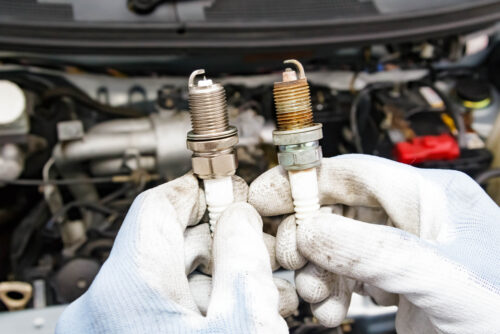How To Change and Replace Spark Plugs

Changing and replacing the spark plugs in your Honda vehicle doesn’t need to be a difficult task. Whether you are replacing Honda Jazz spark plugs or Honda Civic spark plugs, the process is very simple to do and can improve your fuel economy.
You’ll find everything you need to know about spark plugs and how to change them in our expert guide below!
What are spark plugs?
Spark plugs are a part of the ignition system in a petrol engine and they make the engine start. An electrical spark ignites the fuel, which forces the piston along with the cylinder and pushes the crankshaft to rotate, driving the car forwards. For a petrol car, the spark plug is one of the most important components as it allows the vehicle to run.
There are four types of spark plugs that you may come across:
- Copper spark plugs
- Iridium spark plugs
- Platinum spark plugs
- Double platinum spark plugs
Diesel engines don’t use spark plugs; however, as they compress the fuel in the cylinders to make the car move, no additional spark is necessary.
Benefits of replacing your spark plugs
If you notice signs of wear on your spark plugs, don’t ignore them! Replacing your spark plugs when worn will mean you won’t have to worry about a slow or no start, an engine misfire, rough idling or poor acceleration, which can all be caused by a bad spark plug.
There are several other benefits to replacing your spark plug, which could save you time and money in the long run. Check them out below.
1 – Improved fuel economy
Worn-out spark plugs can reduce your fuel economy by as much as 30%, as they lead to high fuel consumption. Changing and replacing your spark plugs can help to reduce harmful emissions, improving your vehicle’s fuel economy in the long run.
2 – Smoother vehicle start
You’ll be able to feel the difference between an old and new spark plug when you turn the key in the ignition on start up. A new spark plug will make starting up your car much more effortless.
3 – Less harmful emissions
Do your bit for the environment and replace your vehicle’s spark plugs when they are worn to help improve your emissions. Since a worn spark plug will be more likely to create engine misfires, these can make more harmful emissions that go into the atmosphere – consider replacing your spark plugs to avoid this.
4 – More consistent combustion system
A new spark plug will allow your engine to continue to smoothly create combustion and ensure your vehicle’s systems run as they should.
How do I know if my spark plug needs changing?
You will know you need to consider spark plug replacement when any of the following occur:
- Slow or no start
- Engine misfire
- Engine is running rough
- The engine produces a rough idle
- Poor acceleration
- High fuel consumption
At the first signs of any of these problems, get yourself a spark plug replacement to ensure your vehicle starts smoothly, and you have a better driving experience.
How often does my spark plug need to be changed?
A spark plug needs to be changed every 30,000 miles; however, this can increase to 75,000 miles depending on the type of spark plug, your car’s manufacturer and how much use you get out of your vehicle. Consult your owner’s manual or speak to a professional if you are unsure whether it is time for you to change spark plugs.
How do I fit more spark plugs in a Honda?
You can change your spark plugs in your Honda vehicle by yourself very easily with our quick step by step guide below.
Don’t worry, though; we understand not everyone is comfortable with doing this, so it would be better to get your spark plugs checked by a mechanic. If you choose to change your spark plugs this way, see if the mechanic can do an oil change and check for other signs of trouble while they are at it.
1 – Prepare and clean the area
First, you need to prepare your workspace and clean the area around the spark plug. This includes opening the bonnet and removing the HT leads and any obstacles or debris in the way of accessing the spark plugs. Consult your vehicle handbook for more information on where to find this.
2 – Remove the old spark plugs
Next is to unscrew the plugs with a spark plug socket spanner and remove them. Ensure that the ignition is off before removing them, so a high voltage current isn’t passed to you while you work.
3 – Check and prepare the new spark plugs
After that, you’ll want to use feeler blades or a gap-setting tool to check the electrode gap of the new plugs to make sure they fit your Honda model. Genuine Honda plugs are pre-gapped and with iridium plugs, it specifically says if the gap that you have to replace is incorrect.
Put a smear of copper grease on the threads of each new plug to help you with replacing them. Screw the plugs into their holes and use a length of flexible hose to start them off.
4 – Fit and tighten the plugs
Now you need to do a final tightening of the plugs to ensure they are set correctly. Check your vehicle manual to find out the correct torque. Use a torque wrench to get the plugs to the right torque.
5 – Reconnect HT leads and finish
The final step is to reconnect the HT leads and refit any other parts that have been removed. This would also be a good time to replace other parts that are possibly damaged, like the HT leads, as you are doing repairs as it is.
FAQs about spark plugs
How many spark plugs does a Honda have?
Depending on your model of Honda, whether you have a Honda Civic, Honda Jazz, or a Honda CR-V, the general rule is that there’s one spark plug for every cylinder of your vehicle. So if you’re driving around in a four-cylinder Honda Civic, for example, you’ll likely have 4 spark plugs.
However, some Honda cars like the Honda Jazz can also have 8 plugs even though they have a 4-cylinder engine. If you’re unsure on how many spark plugs your car has, check the owner’s manual for more information.
How long should factory spark plugs last?
A factory spark plug should last you for every 30,000 miles you drive. However, they can last you up to 75,000 miles depending on the manufacturer, so be sure to check your owner’s manual or talk to a professional to find out how far you can go on yours.
How often should you change spark plugs in a Honda Civic?
How often you’ll need to change your Honda Civic’s spark plugs depends on a few factors. Most spark plugs should last around 30,000 miles but, depending on which spark plugs you use as well as how you drive and service the car, spark plugs can last up to 75,000 miles.
However, if you are unsure, your Honda Civic’s user manual will provide you with more information. Some of the key signs that your Honda Civic’s spark plugs need replacing include:
- The engine light has come on
- Your Honda Civic is struggling to start
- Using more fuel than usual
- Your Civic is slow to accelerate
- The engine sounds rough in idle
If you experience any of these problems, it may be time to replace your spark plugs. Take a look at our Honda Civic parts to find the right replacement parts for your vehicle.
Can I change spark plugs myself?
Yes, you can change spark plugs yourself in your Honda vehicle; simply follow our step-by-step guide above. If you don’t feel comfortable changing it yourself though, it’s always best to call a professional Honda mechanic.
Find the right parts for your Honda
For all of your genuine Honda parts needs, we have you covered at Cox Motor Parts. From Honda engine oil to Honda batteries, we are sure you will find the parts you need for your next Honda project. Contact us today if you have any questions about your Honda part requirements, and our experts will be happy to help.
Read more:





